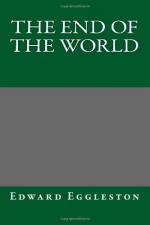CHAPTER XXVII.
THE RESULT OF AN EVENING WITH GENTLEMEN.
All the time that these smiling villains were by consummate art drawing their weak-headed victim into their tolls, what was August doing? Where were his prompt decision of character, his quick intelligence, his fine German perseverance, that should have saved the brother of Julia Anderson from harpies? Could our blue-eyed young countryman, who knew how to cherish noble aspirations walking in a plowman’s furrow—could he stand there satisfying his revenge by witnessing the ruin of a young man who, like many others, was wicked only because he was weak?
In truth, August was a man whose feelings were persistent. His resentment was—like his love—constant. But his love of justice was higher and more persistent, and he could not have seen any one fleeced in this merciless way without taking sides strongly with the victim. Much less could he see the brother of Julia tempted on to the rocks by the false lights of villainous wreckers without a great desire to save him. For the letter of Andrew had ceased now to burn in his pocket. That other letter—the only one that Julia had been able to send through Cynthy Ann and Jonas—that other letter, written all over with such tender extravagances as love feeds on; the thought of that other letter, which told how beautiful and precious were the invitations to the weary and heavy-laden, had stilled resentment, and there came instead a keen desire to save Norman for the sake of Julia and justice. But how to do it was an embarrassing question—a question that was more than August could solve. There was a difficulty in the weakness and wrong-headedness of Norman; a difficulty in Norman’s prejudice against Dutchmen in general and August in particular; a difficulty in the fact that August was a sort of a fugitive, if not from justice, certainly from injustice.
But when nearly a third of Norman’s employer’s money had gone into the gamblers’ heap, and when August began to understand that it was another man’s money that Norman was losing, and that the victim was threatened by no half-way ruin, he determined to do something, even at the risk of making himself known to Norman and to Parkins—was he Humphreys in disguise?—and at the risk of arrest for house-breaking. August acted with his eyes open to all the perils from gamblers’ pistols and gamblers’ malice; and after he had started to interfere, the mud-clerk called him back, and said, in his half-indifferent way:




